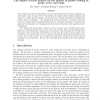Free Online Productivity Tools
i2Speak
i2Symbol
i2OCR
iTex2Img
iWeb2Print
iWeb2Shot
i2Type
iPdf2Split
iPdf2Merge
i2Bopomofo
i2Arabic
i2Style
i2Image
i2PDF
iLatex2Rtf
Sci2ools
SCHEDULING
2008
2008
The impact of local policies on the quality of packet routing in paths, trees, and rings
We consider the packet routing problem in store-and-forward networks whose topologies are either paths, trees, or rings. We are interested by the quality of the solution produced, with respect to a global optimal solution, if each link uses a (fixed) local policy to schedule the packets which go through it. The quality of the derived solutions is measured using the worst case analysis for two global optimality criteria, namely the maximum arrival date of a packet at its destination (or makespan) and the average arrival date of the packets at their destinations. We consider the setting where n packets, each one having a size (or length) and a destination, are released from the same source. In the case of rings, there exist two paths between the source and a destination. Each packet is owned by a user which chooses a path to its destination. We assume that users are rational: knowing the local policy used by the links and the state of the network, a user chooses the path which minimizes...
| Added | 28 Dec 2010 |
| Updated | 28 Dec 2010 |
| Type | Journal |
| Year | 2008 |
| Where | SCHEDULING |
| Authors | Eric Angel, Evripidis Bampis, Fanny Pascual |
Comments (0)

